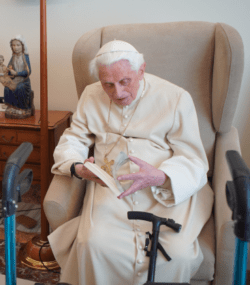“In reality, a new council proved to be not only meaningful, but necessary. For the first time, the question of a theology of religions had shown itself in its radicality,” he pointed out.
Newsroom (23/10/2022 11:52 AM Gaudium Press) — In a new letter, Pope Emeritus Benedict XVI characterizes the Second Vatican Council as “not only meaningful, but necessary.”
Released Thursday, the letter is addressed to Father Dave Pivonka, TOR, president of the Franciscan University of Steubenville in Steubenville, Ohio, which concludes a two-day conference Friday centred on the theology of Benedict XVI/Joseph Ratzinger.
Nearly three and a half typewritten pages long, the letter provides fresh observations about Vatican II from one of the few remaining theologians in the Catholic Church to personally participate in the historical council, which opened 60 years ago this month.
“When I began to study theology in January 1946, no one thought of an Ecumenical Council,” the 95-year-old retired pope recalls in the letter.
“When Pope John XXIII announced it, to everyone’s surprise, there were many doubts as to whether it would be meaningful, indeed whether it would be possible at all, to organize the insights and questions into the whole of a conciliar statement and thus to give the Church a direction for its further journey,” Benedict observes.
“In reality, a new council proved to be not only meaningful, but necessary. For the first time, the question of a theology of religions had shown itself in its radicality,” he continues.
“The same is true for the relationship between faith and the world of mere reason. Both topics had not been foreseen in this way before. This explains why Vatican II at first threatened to unsettle and shake the Church more than to give her a new clarity for her mission,” Benedict writes.
“In the meantime, the need to reformulate the question of the nature and mission of the Church has gradually become apparent,” he adds. “In this way, the positive power of the Council is also slowly emerging.”
Benedict writes that ecclesiology — the theological study of the nature and structure of the Church — had evolved after World War I. ”If ecclesiology had hitherto been treated essentially in institutional terms,” he says, ”the wider spiritual dimension of the concept of the Church was now joyfully perceived.”
At the same time, he writes, the concept of the Church as the mystical body of Christ was being critically reconsidered.
In this situation, he says, he wrote his doctoral dissertation on the topic of ”People and House of God in Augustine’s Doctrine of the Church.”
He writes that ”the complete spiritualization of the concept of the Church, for its part, misses the realism of faith and its institutions in the world,” adding that ”in Vatican II, the question of the Church in the world finally became the real central problem.”
The retired pope, who resigned in 2013, concludes the letter by summing up his purpose for writing.
”With these considerations I only wanted to indicate the direction in which my work has led me,” he writes. ”I sincerely hope that the International Symposium at Franciscan University of Steubenville will be helpful in the struggle for a right understanding of the Church and the world in our time.”
– Raju Hasmukh with files from CNA

































